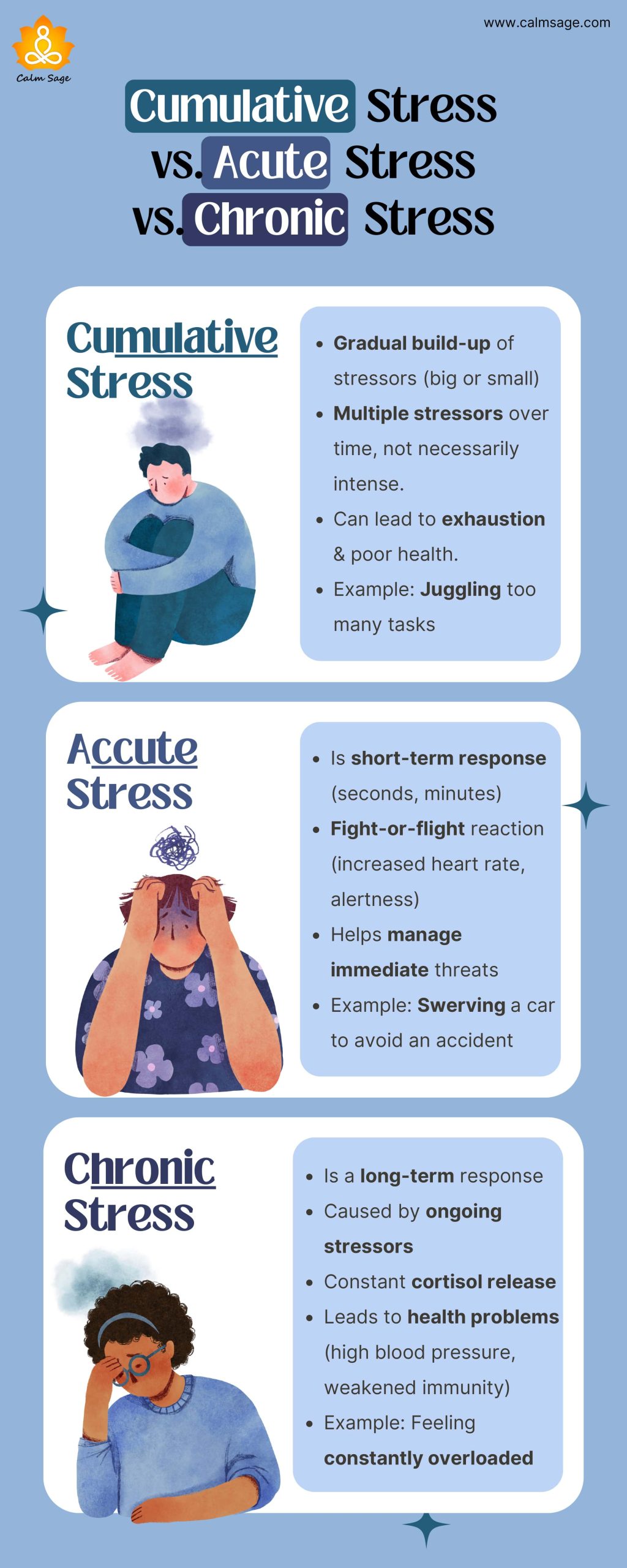Stressed Out and Can’t Stop? You Might Be Dealing With Cumulative Stress

We all have bucket lists, right? Now, imagine that instead of having places to go before you turn 40, cuisines to try, and other wishes, you keep adding stressors – big and small – to the bucket list. Odd, isn’t it? Well, that’s what we do to our mental list. Every day, we experience stressors and then use them as pebbles to throw into our mental bucket.
Acute stress – a sudden job interview, for instance – might be a small pebble. But, when you keep piling your bucket with pebbles – big or small – without emptying your bucket, it starts overflowing. This overflow of stress is what we can call cumulative stress, a relentless burden that can leave us feeling drained and overwhelmed.
Knowing where cumulative stress comes from and what it looks like can help you effectively battle it and take care of your physical and mental health. So, if you’re stressed out and can’t seem to stop, then read on to learn how to manage cumulative stress.
Related: Stress-o-Meter: Stress Quiz to Test Your Stress Level
What is Cumulative Stress?
Cumulative stress, also known as allostatic load, is the prolonged exposure to stress that builds up over time. Unlike acute stress, which comes from a single event and resolves quickly, cumulative stress is a consequence of multiple stressors, big and small, that persist over an extended period.
Think of cumulative stress like a credit card; every stressor you encounter is a swipe, adding to the debt. First, you might manage it with small changes here and there, but eventually, the mounting debt becomes overwhelming.
Similarly, cumulative stress can lead to a burnout-like stage where you’re eternally exhausted.
Cumulative Stress vs. Acute Stress vs. Chronic Stress

Acute stress is the body’s immediate response to a perceived threat. It’s the “flight-or-fight” reaction, a short-term physiological response that helps us deal with immediate stress and problems. Think of acute stress as hitting the brakes to avoid an accident. Acute stress can be beneficial for us, as it helps us stay focused and react quickly.
About chronic stress; when the stress response is constantly activated due to prolonged stressors – for example, relationship issues, demanding jobs, etc. – then it becomes chronic stress. Over time, this can cause health problems and scares such as high blood pressure, heart attacks, and poor immunity. Chronic stress can be caused by a single, constant stressor.
Cumulative stress arises from the accumulation of stressors – big or small – over time. It’s the chronic nature of stressors, not necessarily the intensity of a single stressor. This type of specific stress can lead to exhaustion and can also cause poor health. It’s like juggling too many tasks at once. While each task might be manageable on its own, the cumulative burden of them becomes overwhelming.
Related: Chronic Stress & It’s Effect On Your Health
Causes of Cumulative Stress
Various factors can contribute to cumulative stress. From work-related stress to finances and from relationships to health – stressors in these areas of life can cause stress to pile up if left unaddressed. Examples of some common factors include;
- Long working hours, demanding workload, lack of job security, or a toxic work environment
- Financial stress, debt, unexpected financial burden
- Relationship conflicts, family stress, toxic friendships, etc.
- Caregiver stress, anticipatory stress, health scares, poor physical health
- Major life transitions such as moving cities, changing jobs, marriage, divorce, or having children
- Everyday minor stressors like traffic jams, long waiting lines, or other issues
It’s important to remember that the kind of stressors you experience might not bother anyone else. How we handle stress varies based on our personality, life experiences, and available support systems.
What Does Cumulative Stress Look Like?
Our bodies are made to handle short episodes of stress. However, cumulative stress can disrupt this balance, causing physical manifestations. Common signs of cumulative stress can include;
Physical symptoms of cumulative stress
- Muscle tension and headaches
- Tightness in the neck, shoulders, and back
- Persistent fatigue
- Difficulty falling asleep or staying asleep at night
- Changes in appetite
- Digestive problems such as upset stomach, heartburn, constipation, or diarrhea
- Poor immune system
- Increased risk of chronic health problems
Psychological symptoms of cumulative stress
- Easily getting frustrated
- Being short-tempered
- Sudden shifts in mood
- Constantly worrying and feeling overwhelmed
- Negative thinking
- Feelings of hopelessness and sadness
- Losing interest in activities you once enjoyed
- Withdrawing from social interactions
- Feeling isolated and disconnected from others
- Feeling emotionally exhausted
- Increased cynicism
Cumulative Stress and Its Impact on Health
If cumulative stress is left unaddressed, then it can have a significant impact on different aspects of your life. For example, chronic stress can put a strain on your relationships with your family and friends, even romantic relationships.
At one point, you might struggle with concentration, and making decisions, and will feel continually exhausted. This can impact your productivity and performance at work and school. I mentioned earlier that cumulative stress can increase your risk of developing chronic health problems such as heart disease, high blood pressure, etc.
Untreated stress can also lead to the development of anxiety disorders, depression, and other mental health conditions. In the end, stress – chronic or cumulative – can impact your quality of life.
Cumulative stress can be a great contributor to anxiety disorder. The constant feeling of being overwhelmed and the physical symptoms of stress can trigger panic attacks and worsen generalized anxiety disorder. Moreover, the anxious thoughts and worries associated with chronic stress can become a never-ending cycle, only fueling stress.
What you need to understand is that not everyone who lives with cumulative stress will develop anxiety disorders. If you’re struggling with chronic stress and find that anxiety is affecting your day-to-day life, then it’s a sign that you need to speak to a professional for help and support.
How to Deal with Cumulative Stress?
The best part is that with effective strategies and help, you can manage cumulative stress and improve your well-being. Here are some things you can do to cope with cumulative stress;
1. Know Your Stressors
The first thing you need to do is know your stressors. Become familiar with what triggers your stress. You can make a stress journal to track down patterns and identify where your stress comes from and what triggers it.
2. Engage in Healthy Coping
Replace unhealthy coping strategies such as consuming alcohol or using drugs with healthy alternatives like exercising, relaxing techniques, deep breathing, nature therapy, or engaging in expressive hobbies.
3. Calm Your Mind and Body
Next, you need to calm your mind and body with relaxation techniques and exercises such as deep breathing, progressive muscle relaxation (PMR), mindfulness meditation, and more. These exercises can calm your mind and body during stressful situations.
4. Sleep Well
I know this tip doesn’t sound as effective, but trust me, sleep plays a big role in helping you manage stress. Try to sleep for 7–8 hours each night. Regular sleep is important for managing stress and promoting your health – mental and physical.
5. Live a Healthy Lifestyle
Eat a well-balanced diet, exercise regularly, and try to limit stimulant beverages such as coffee and alcohol. Try to live an active lifestyle. Your lifestyle choices contribute to your sense of well-being and how you learn to bounce back from stressful situations.
6. Set Boundaries
Learn to say “NO” to additional responsibilities when you’re already overwhelmed. Prioritize your well-being and start by setting boundaries with yourself, work, family, and social commitments. If you don’t have anything left in your reserve, what will you give others?
7. Seek Social Support
Try to connect with your loved ones who can offer you emotional support and approach you with understanding. Having a strong social support network can help you buffer the impact of stress. Choose the kind of people who support you and understand your struggles, not the ones who take away your energy.
8. Take Care of Yourself
Whenever you can, schedule time for activities you enjoy, even if it’s just for 15 minutes a day. Taking care of yourself is as important as any other stress management activity to manage stress. When you’re in top shape – physically and mentally – you can better manage your emotional and mental health.
Can We Treat Cumulative Stress?
In some cases, professional help might be necessary to manage cumulative stress and its symptoms. Therapy can help you with coping mechanisms and relaxation techniques. Depending on the severity of your stress, a therapist can offer you treatment approaches such as;
- Cognitive-Behavioral Therapy (CBT): CBT is a therapy approach that helps identify and change negative thought patterns that contribute to stress.
- Acceptance and Commitment Therapy (ACT): ACT focuses on accepting negative thoughts and feelings without judging them, and committing to take action that aligns with your beliefs.
- Mindfulness-Based Therapies: These types of approaches teach mindfulness techniques like meditation to help manage stress and improve how you regulate your emotions.
Wrap Up…
Cumulative stress is a growing concern in today’s world. However, knowing the symptoms of cumulative stress and its impact, you can equip yourself with effective coping strategies and treatment plans.
Taking care of yourself, building healthy habits, and reaching out to a professional are some of the things that can contribute to managing cumulative stress. Remember, you’re not alone in this. Take proactive steps to find a sense of calm and improve your well-being in stressful times.
Taking care of your mental health is as important as taking care of your physical health. Don’t hesitate to reach out for professional help when needed.
I hope this article helped you understand what cumulative stress is, its signs, and how to cope with it. Let me know your thoughts in the comments below.
Take Care!




















